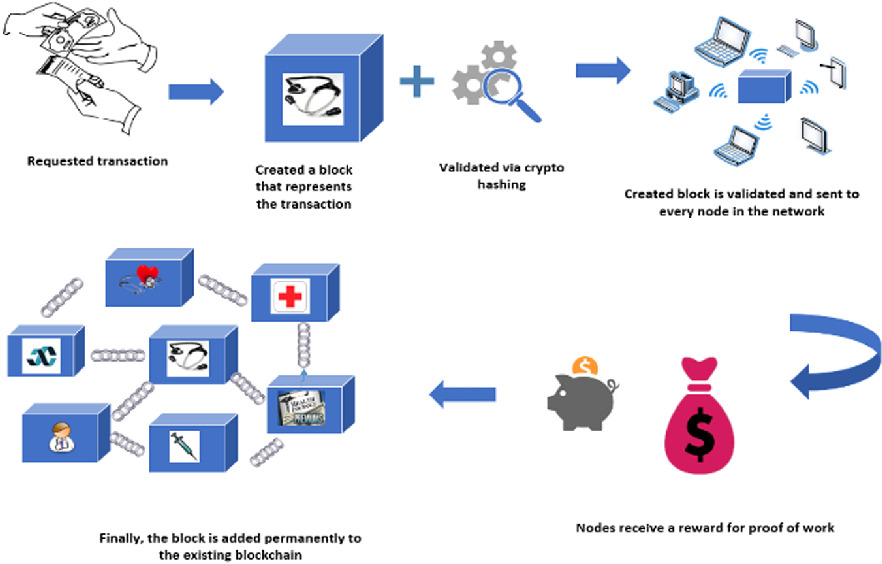According to a report from IDC 1 in every 5 medical and healthcare organizations will start using blockchain for information management and patient identity purposes by 2020. There is no denying that the blockchain impact on.
 Blockchain Applications In Healthcare A Review And Future Perspective Springerlink
Blockchain Applications In Healthcare A Review And Future Perspective Springerlink
Discussions include tech specs.

Blockchain applications in healthcare. Blockchain applications in healthcare are not only helping preserve and safeguard data integrity but are also helping pharma companies in regulating the drug supply chain recruiting patients for clinical trials facilitating interoperability with IoT devices and much more. Applications in healthcare. With improved integration the industry can become.
Blockchain applications are at an early stage in healthcare. Finally to implement a blockchain solution organizations may choose to use a permissionless blockchain such as the Bitcoin blockchain or a permissioned blockchain that restricts access to a pre-determined group. This process is an absolute mess.
While the adoption of blockchain in healthcare has been comparatively slow all these years a major paradigm shift is en route. Blockchain adoption in Healthcare. At present electronic health information records of patients can be automatically shared only within a network of organizations.
Blockchain is considered to be a highly secure transparent and immune to hackers due to its digital encryption it also plays a prominent role in reducing the intermediate fees as it is entirely decentralized. Blockchain technology can enhance the healthcare ecosystem by working in the following ways. Applications of blockchain technology in health care including prior-authorizations and auto-claims processing.
Safe monitoring of Electronic Health Records EHRs. By 2025 55 percent of all healthcare. Today on t.
What it can do for both consumers and providerspayers. Consortia such as R3. The blockchain healthcare applications will come equipped with the latest technology can solve the challenges that the healthcare industry is going through.
This is the way that blockchain can help consumers of medical services. Firstly medical history data. Due to its potential blockchain has gathered significant interest in the healthcare industry.
Blockchain is decentralized distributed and immutable and hence it holds an immense. The most interesting features in blockchain that are beneficial to healthcare applications is decentralization privacy and security since blockchain technology may ensure for example a secure access to medical data for patients and various stakeholders insurance companies hospitals doctors etc. Some examples of blockchain technology frameworks that are in use at present on a relatively small scale include Ethereum and.
The application of blockchain in healthcare is nascent. Blockchain has the potential to solve these problems as it provides trust without any intermediaries has traceability as a default feature and promises new business models by enabling novel incentive structures. 73k members in the Blockchain_Healthcare community.
Blockchain has been in the media a lot recently for its applications in cryptocurrency but how could we apply this same technology for health. Blockchains role for medical history sharing. Blockchain technology can absolve the healthcare industry from facing these challenges.
Blockchain applications in the healthcare sector generally require more stringent authentication interoperability and record sharing requirements due to exacting legal requirements such as Health Insurance Portability and Accountability Act of 1996 HIPAA. Despite substantial progress blockchains relationship with healthcare is still at an early stage. Nevertheless early solutions shown the potential to reduce healthcare costs streamline business processes and improve access to information across disparate and diverse stakeholders working toward a common goal.
This can be changed if blockchain technology is used to store the data which would easily provide. Oodles Healthcare solutions work with Ethereum blockchain solutions to develop a variety of healthcare applications including. Building on existing blockchain technologies researchers in both academia and industry have started to explore.
The focus should be on improving the quality of healthcare and ensuring that it takes a patient-centric approach rather than maximizing profit. Emerging blockchain applications in the healthcare sector. Adding or Updating Data.
Some of these burgeoning blockchain applications include providing evidence for health insurance claims real-time disease tracking and even protecting genomic data involved in DNA sequencing from theft. It can establish a blockchain of medical records. Blockchain technology assists the healthcare sector with increased data safety efficiency monitoring and accountability while minimizing costs.
Blockchain in healthcare. The areas in particular are medical history sharing and selling medical data on a blockchain marketplace. Blockchain applications in the healthcare sector generally require more stringent authentication interoperability and record sharing requirements due to exacting legal requirements such as Health Insurance Portability and Accountability Act of 1996 HIPAA.